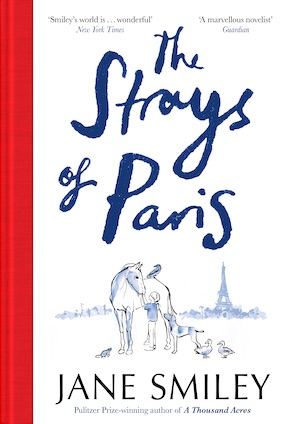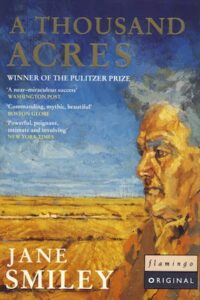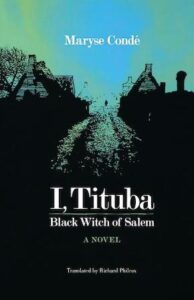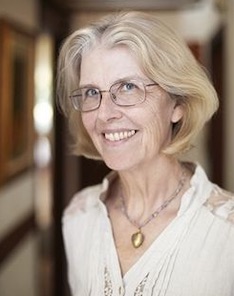Runaways and free spirits
by Jane Smiley
“The life-affirming grown-up fable we all need… Jane Smiley has created a world where kindness is king.” Washington Independent Review
“Every landscape needs a figure in it, perhaps especially a figure that is only intermittently visible, that is mysterious and alert,” observes a gardener in Jane Smiley’s The Strays of Paris who spies a beautiful racehorse roaming freely in the middle of the French capital.
The racehorse is Paras (short for Perestroika). She became a ‘runaway’ when her owner accidently left her stall unlocked one evening. Curious, she ventured out and began to wander into the city and meet some of its less visible inhabitants.
Jane Smiley’s delightful tale is a whimsical tonic for our stricken times. Insightful and good-humoured, this modern fable relays the story of a mish-mashed community made of loveable oddballs. Amongst the motley crew in Paras’ orbit are an elegant German pointer named Frida, know-it-all raven Raoul, territorial ducks Sid and Nancy, Runt the rat, a young lad named Etienne and his centenarian great-grandmother. It’s warm-hearted, wonderfully written and it reminds us of the goodness we are all capable of.
The last few years have been brutal. How to define the spirit of these times? Divided, intolerant, angry, suspicious, unkind… Each of us will have our own preferred adjective to describe the world today, and we have all been made to feel like strays at some point in our lives, whether by gender, colour, race, religion or political or sexual leanings. When we find our like-minded kin, the generosity of spirit knows no bounds, and this message is at the heart of Smiley’s uplifting and necessary book.
As lockdown rumbles on, now’s the time to peer into gardens and parks a little more closely and watch the stories unfold between the cat and the fox, the squirrel and the magpie, and with the human who occasionally stops to pass the time with them.
Where are you now?
Sitting against pillows in my bed with my computer in my lap and a beautiful blue sky and green mountains out the window. At home.
Do you live with animals?
One dog in the house (she follows my husband everywhere) and three horses at the stable (according to the animal communicator, one of those would prefer to live in our backyard and look in the windows).
How would you summarise your lockdown experience?
Pretty good, not bad, I can’t complain, but actually, everything is just about the same (stolen from John Prine).
 Where and when do you do most of your writing?
Where and when do you do most of your writing?
Right here, right about now.
If you have one, what is your pre-writing ritual?
Reading yesterday’s work to my husband, fetching a Diet Coke and a small square of chocolate, scratching my head, getting started.
Full-time or part-time?
About 1,250 words. Could be either one.
Pen or keyboard?
Laptop.
How do you relax when you’re writing?
By writing.
How would you pitch your latest book in up to 25 words?
A horse escapes from a racetrack into Paris! You’re kidding me! Well, in a way, yes. And then she meets a dog! And then…
Have you ever felt like a stray?
Hitchhiking around Europe in 1971–2, sometimes abandoned by the side of the road, but often helped and entertained.
What does friendship mean to you?
Kindness, amusement, connection.
We have all been made to feel like strays at some point in our lives, whether by gender, colour, race, religion or political or sexual leanings.”
Who do you write for?
Myself and my husband. After that, my publisher.
Who do you share your work in progress with?
My husband and an old friend who was once my editor but got out of the business.
Which literary character do you wish you created?
Jeeves.
Share with us your favourite line/s of dialogue, poetry or prose.
“It is a truth universally acknowledged that a single man in possession of a good fortune must be in want of a wife.”
Jane Austen, Pride and Prejudice
 “Let us go then, you and I,
“Let us go then, you and I,
When the evening is spread out against the sky
Like a patient etherized upon a table.”
T.S. Eliot, ‘The Love Song of J. Alfred Prufrock’
Which book/s have you most recently read and enjoyed?
Leave the World Behind by Rumaan Alam.
Safe From the Sea by Peter Geye.
I, Tituba by Maryse Condé.
The Joy Luck Club by Amy Tan.
Which book are you recommending most often right now?
Conceit by Mary Novik.
What’s on your bedside table or e-reader and which will you read next?
The Return of Jeeves by P.G. Wodehouse.
In This Our Life by Ellen Glasgow.
Which books do you feel you ought to have read but haven’t yet?
I don’t think in these terms.
Which book/s do you treasure the most?
All of them.
What is the last work you read in translation?
Fathers and Sons by Ivan Turgenev.
What are you working on next?
A murder mystery set in 1850s Monterey, Ca.
Imagine you’re the host of a literary supper, who would your dinner guests be (living or dead, real or fictional)?
Halldór Laxness, Rebecca West, Harriet Beecher Stowe, Octavia Butler, Marguerite of Navarre, Julia Child (she would have been in the kitchen, but now she would be at the table).
If you weren’t writing you’d be…?
Riding, walking, looking around.
If you were the last person on Earth, what would you write?
Tears of rage.
 Jane Smiley is a novelist and essayist. Her novel A Thousand Acres won the Pulitzer Prize and the National Book Critics Circle Award in 1992, and The All True Travels and Adventures of Lidie Newton won the 1999 Spur Award for Best Novel of the West. She has been a member of the American Academy of Arts and Letters since 1987. Her novel Horse Heaven was shortlisted for the Orange Prize in 2002, and Private Life was chosen as one of the best books of 2010 by The Atlantic, The New Yorker, and The Washington Post. The Strays of Paris is published in hardback, eBook and audio download by Mantle.
Jane Smiley is a novelist and essayist. Her novel A Thousand Acres won the Pulitzer Prize and the National Book Critics Circle Award in 1992, and The All True Travels and Adventures of Lidie Newton won the 1999 Spur Award for Best Novel of the West. She has been a member of the American Academy of Arts and Letters since 1987. Her novel Horse Heaven was shortlisted for the Orange Prize in 2002, and Private Life was chosen as one of the best books of 2010 by The Atlantic, The New Yorker, and The Washington Post. The Strays of Paris is published in hardback, eBook and audio download by Mantle.
Read more
@MantleBooks
Author portrait © Derek Shapton

